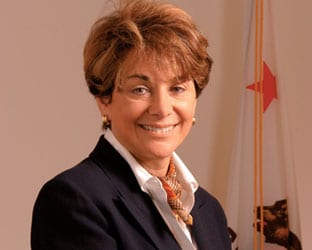 Every commissioner and just about every legislator we’ve heard is in favor of legislation that would allow FCC commissioners broader ability to communicate with one another behind closed doors. However, such legislation has always been attached to other items that failed to pass, so a bipartisan, bicameral group on Capitol Hill led by Anna Eshoo (D-CA) is back to try again.
Every commissioner and just about every legislator we’ve heard is in favor of legislation that would allow FCC commissioners broader ability to communicate with one another behind closed doors. However, such legislation has always been attached to other items that failed to pass, so a bipartisan, bicameral group on Capitol Hill led by Anna Eshoo (D-CA) is back to try again.
The FCC Collaboration Act of 2013 is being presented for Congressional consideration by Eshoo, the Ranking Member of the House Communications Subcommittee, along with John Shimkus (R-IL) and Mike Doyle (D-PA); and Amy Klobuchar (D-MN) and Dean Heller (R-NV) in the Senate.
“If the FCC is expected to tackle some of the nation’s most pressing communications issues, Commissioners must have the ability to communicate freely,” said Rep. Eshoo, Ranking Member on the Communications and Technology Subcommittee. “Simple collaboration, discussion of issues, and shared expertise outside an official setting are essential in order for the Commission to keep up with the rapidly changing telecommunications landscape.”
“I have always been a supporter of ending this ridiculous FCC rule. Allowing Commissioners to talk to one another will only lead to better and more efficient work being done at the FCC, not the other way around,” said Rep. Shimkus.
“We’ve got to give our FCC Commissioners and Joint Board Members a chance to get together in private in a bipartisan fashion to discuss important matters,” said Rep. Doyle. “Public settings such as the FCC Open Meetings provide an important way for the public to learn about the FCC’s actions, but they don’t let Commissioners deliberate directly at length the tough communications issues facing the Commission.”
“Improving our country’s communications infrastructure is critical to our economy and to our public safety,” said Senator Klobuchar. “This bill will go a long way to make the FCC more efficient and effective so they can continue to work to advance the technological innovations that keep the U.S. competitive.”
“This common-sense legislation will encourage discussion and cooperation among FCC Commissioners, and allow for the agency to be more responsive to a rapidly changing marketplace. While the Sunshine Act is well-intended, a simple modification is needed to encourage progress as the agency faces decisions across a wide array of industries. I look forward to working with Senator Klobuchar to advance this bipartisan legislation in the United States Senate, and with Representatives Eshoo and Shimkus to enact this bill into law,” said Senator Heller.
FCC Commissioner Ajit Pai quickly released a statement in support of the bill. He said, “I commend Representatives Anna Eshoo, John Shimkus, and Mike Doyle as well as Senators Amy Klobuchar and Dean Heller on the introduction of the Federal Communications Commission Collaboration Act of 2013 (“Act”). Whether it is Congress or state commissions, companies or consumers, we at the FCC hear a common refrain: our processes need reform. In particular, we have heard that—to quote the Act—‘[n]umerous regulatory matters have been pending before the Commission for years, and continued inaction on these issues has the potential to hinder innovation and private investment in the domestic communications industry.’”
Pai continued, “We must be as nimble as the communications industry we oversee. The FCC Collaboration Act would help us do that by allowing greater interaction among the Commissioners. We could respond better and more quickly to everyone with business before the FCC, from broadcasters in Illinois to technology companies in California. The Act also would help us meet deadlines set by Congress and the shot clocks we set for ourselves. Finally, the FCC Collaboration Act would facilitate a more fruitful dialogue about the potential costs and benefits of Commission action.”
In conclusion, Pai said, “This legislation is one of the many steps needed to put the FCC on the right procedural track. Other good ideas can be found in the FCC Consolidated Reporting Act of 2012 and the FCC Process Reform Act of 2012. I look forward to working with Congress as it considers ways to improve the Commission’s internal procedures.”
RBR-TVBR observation: The fact that this bill is still kicking around without any action is shameful. It’s a simple common sense fix to a problem that the commissioners have been complaining about for years, and the student government of an elementary school would have no trouble voting it through.
On top of that, it isn’t the sort of bill that gives leverage to one side or another. There really is only one side – those in favor.
So why does it not get a vote on a standalone basis?
The fact that nothing has been done with this measure underscores the hopeless dysfunction of Congress in recent years. It would be nice if it gets passed this time around for no other reason that to give citizens at least some faint hope that they aren’t being governed by an incompetent gaggle of buffoons.





